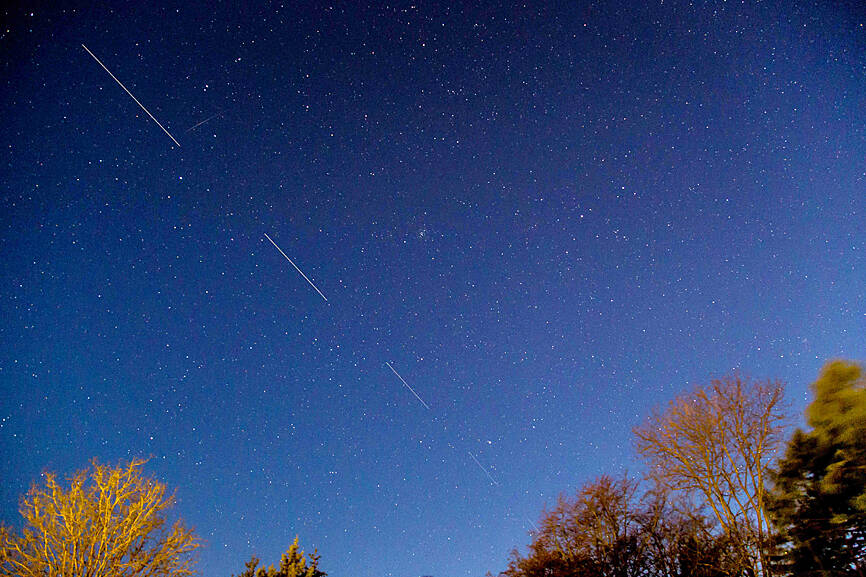Two US lawmakers on Saturday said they discussed the possibility of bringing Elon Musk’s Starlink satellite system into Taiwan with President Tsai Ing-wen (蔡英文), to help Taipei’s deterrence against China.
US Representative Michael McCaul, chairman of the US House of Representatives Foreign Affairs Committee, and US Representative French Hill, among a congressional delegation that visited Taipei last week, said it was one of the “constructive takeaways” in their talks with Tsai on Saturday.
The Presidential Office said it had no comment on Starlink, but issued a statement saying that McCaul and his delegation met with Taiwanese leaders from various industries including semiconductors and aerospace technology.

Photo: AFP
The Republican lawmakers did not say if they had discussed the idea with Musk or Starlink, the fleet operated and launched by the billionaire’s Space Exploration Technologies Corp, which has more than 3,000 satellites in orbit.
Last year, Musk angered Taipei by proposing his own solution for the tensions between China and Taiwan — handing some control to Beijing.
He also said then that Beijing had sought assurances that he would not offer Starlink’s Internet service in China.
“Communist China is very good at what we call intelligence surveillance reconnaissance,” McCaul told reporters on Saturday. “They have great eyes on — they can see everything in the Pacific. In some cases, better than we can in this area. Taiwan has none of that.”
Taiwan would benefit from Starlink’s satellites because of vulnerabilities in its undersea cables, Hill said, adding that it would have to make a national security exception for the company to operate.
The visit by the US congressional delegation, which arrived on Thursday and departed on Saturday, was part of a larger visit to the Indo-Pacific region, the American Institute in Taiwan said.

NUMBERS IMBALANCE: More than 4 million Taiwanese have visited China this year, while only about half a million Chinese have visited here Beijing has yet to respond to Taiwan’s requests for negotiation over matters related to the recovery of cross-strait tourism, the Tourism Administration said yesterday. Taiwan’s tourism authority issued the statement after Chinese-language daily the China Times reported yesterday that the government’s policy of banning group tours to China does not stop Taiwanese from visiting the country. As of October, more than 4.2 million had traveled to China this year, exceeding last year. Beijing estimated the number of Taiwanese tourists in China could reach 4.5 million this year. By contrast, only 500,000 Chinese tourists are expected in Taiwan, the report said. The report

Temperatures are forecast to drop steadily as a continental cold air mass moves across Taiwan, with some areas also likely to see heavy rainfall, the Central Weather Administration (CWA) said. From today through early tomorrow, a cold air mass would keep temperatures low across central and northern Taiwan, and the eastern half of Taiwan proper, with isolated brief showers forecast along Keelung’s north coast, Taipei and New Taipei City’s mountainous areas and eastern Taiwan, it said. Lows of 11°C to 15°C are forecast in central and northern Taiwan, Yilan County, and the outlying Kinmen and Lienchiang (Matsu) counties, and 14°C to 17°C

SHIPS, TRAINS AND AUTOMOBILES: The ministry has announced changes to varied transportation industries taking effect soon, with a number of effects for passengers Beginning next month, the post office is canceling signature upon delivery and written inquiry services for international registered small packets in accordance with the new policy of the Universal Postal Union, the Ministry of Transportation and Communications said yesterday. The new policy does not apply to packets that are to be delivered to China, the ministry said. Senders of international registered small packets would receive a NT$10 rebate on postage if the packets are sent from Jan. 1 to March 31, it added. The ministry said that three other policies are also scheduled to take effect next month. International cruise ship operators

STEERING FAILURE: The first boat of its class is experiencing teething issues as it readies for acceptance by the navy, according to a recent story about rudder failure The Hai Kun (海鯤), the nation’s first locally built submarine, allegedly suffered a total failure of stern hydraulic systems during the second round of sea acceptance trials on June 26, and sailors were forced to manually operate the X-rudder to turn the submarine and return to port, news Web site Mirror Daily reported yesterday. The report said that tugboats following the Hai Kun assisted the submarine in avoiding collisions with other ships due to the X-rudder malfunctioning. At the time of the report, the submarine had completed its trials and was scheduled to begin diving and surfacing tests in shallow areas. The X-rudder,